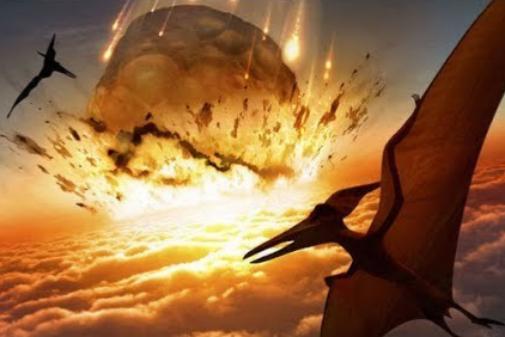- Science: A 'geological autopsy' on a crater reconstructs how an asteroid extinguished dinosaurs
- Adriana Campo. "The asteroid that extinguished the dinosaurs helped humans appear"
Meteorite or volcanism. This is the scientific debate about the cause that ended the dinosaurs, which is joined by a study that indicates that the extinction was caused by the first, since the great volcanic eruption recorded in India would have happened much earlier .
66 million years ago there was the mass extinction of the Cretaceous-Paleogene, which killed 75% of the terrestrial species.
Many scientists acknowledge that it occurred after an asteroid fell in Mexico , but others have suggested that an episode of volcanism occurred in the Deccan Traps , where some 500,000 cubic kilometers of lava flooded most of the India and its marine depths.
An international team, made up of others by the paleontologist and professor at the University of Zaragoza, Laia Alegret , points out in a study published by Science , that volcanic activity "did not have a direct effect" on extinction, but that it was all due To an asteroid.
In this work, experts did not focus on the time of lava eruption through rock dating, but on when the release of gases occurred , said Paul Wilson of the University of Southampton and a member of the equipment.
Although volcanoes can lead to mass extinction because they release a large amount of sulfur dioxide or carbon dioxide , which can alter the climate and acidify the world, the results suggest that "at least 50% or more" of the gas release "It happened long before the impact of the asteroid," so this was "the only driver of extinction," says the note.
"Many people have speculated that volcanoes were important for mass extinction, but we say: No, they were not, " said Pincelli Hull, a geologist at Yale University (USA) and lead author of the study.
The analysis of marine fossils and several climatic models show that most of the release of volcanic gases occurred about 200,000 years before the impact of the asteroid .
"The volcanic activity in the late Cretaceous caused a gradual warming event of about two degrees, but not a mass extinction," said Michael Henehan of the same university and charged with collecting temperature data.
Other recent studies in the Deccan Traps indicate that there were also large eruptions in the period immediately after the mass extinction, which has baffled experts because there is no warming event that matches that other volcanic event. The new work suggests a answer to this enigma. The great extinction profoundly altered the global carbon cycle and the results show that these changes would allow the ocean to absorb a large amount of CO2 over prolonged time scales, perhaps hiding the effects of warming caused by volcanism in the aftermath of this event, he explained. Donal Penman de la Yale.
In addition, according to the results, volcanic gases may have played an important role in shaping different species that emerged after extinction, instead of being the drivers of the initial event.
According to the criteria of The Trust Project
Know more- science
- Science and Health
Science Prince William launches Earthshot, an award that aspires to become the Nobel Prize in Ecology
ScienceChina bans fishing in the Yangtze, the third longest river in the world
EspacioIndia prepares its third lunar mission after the failure of Chandrayaan-2

